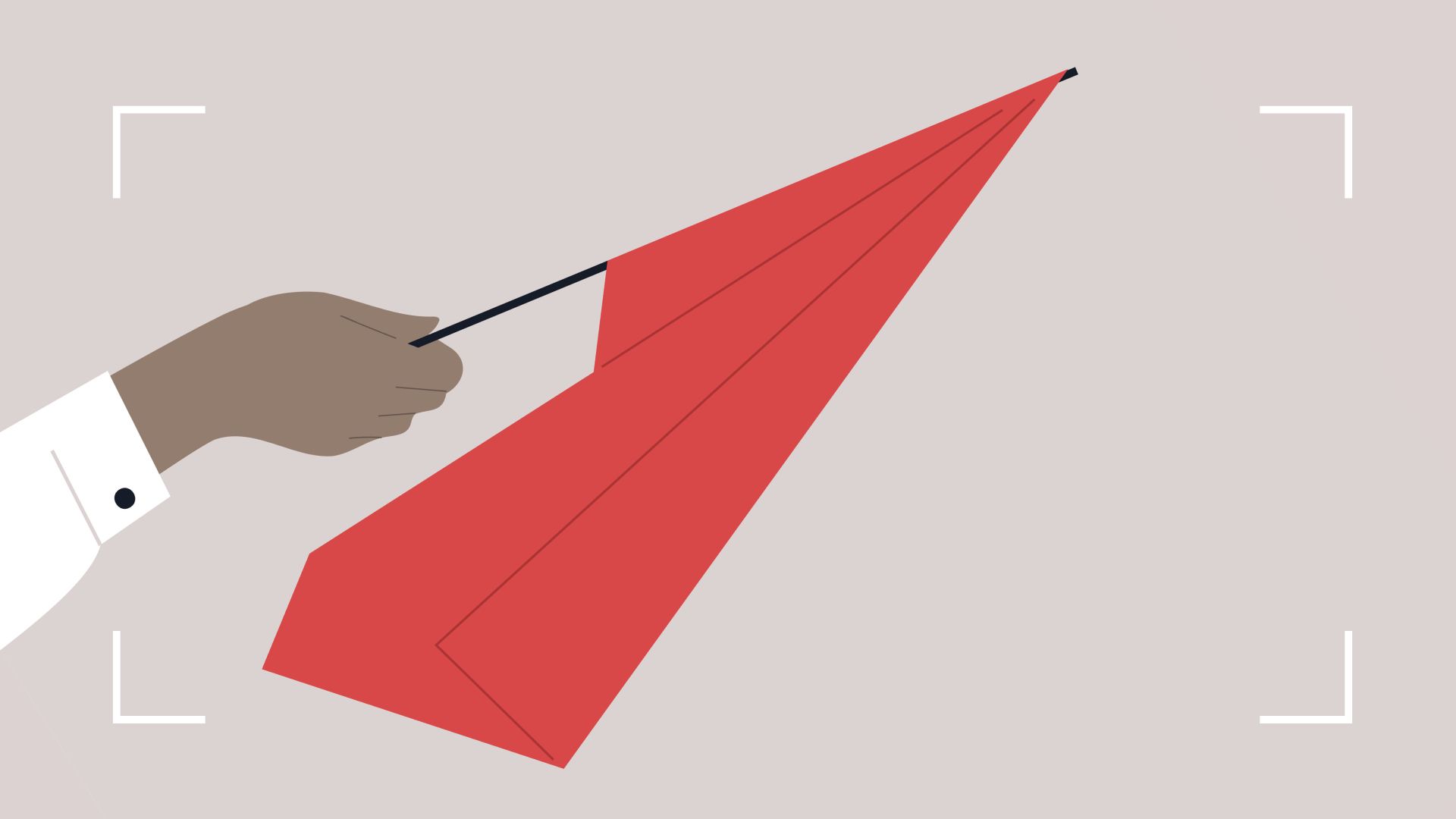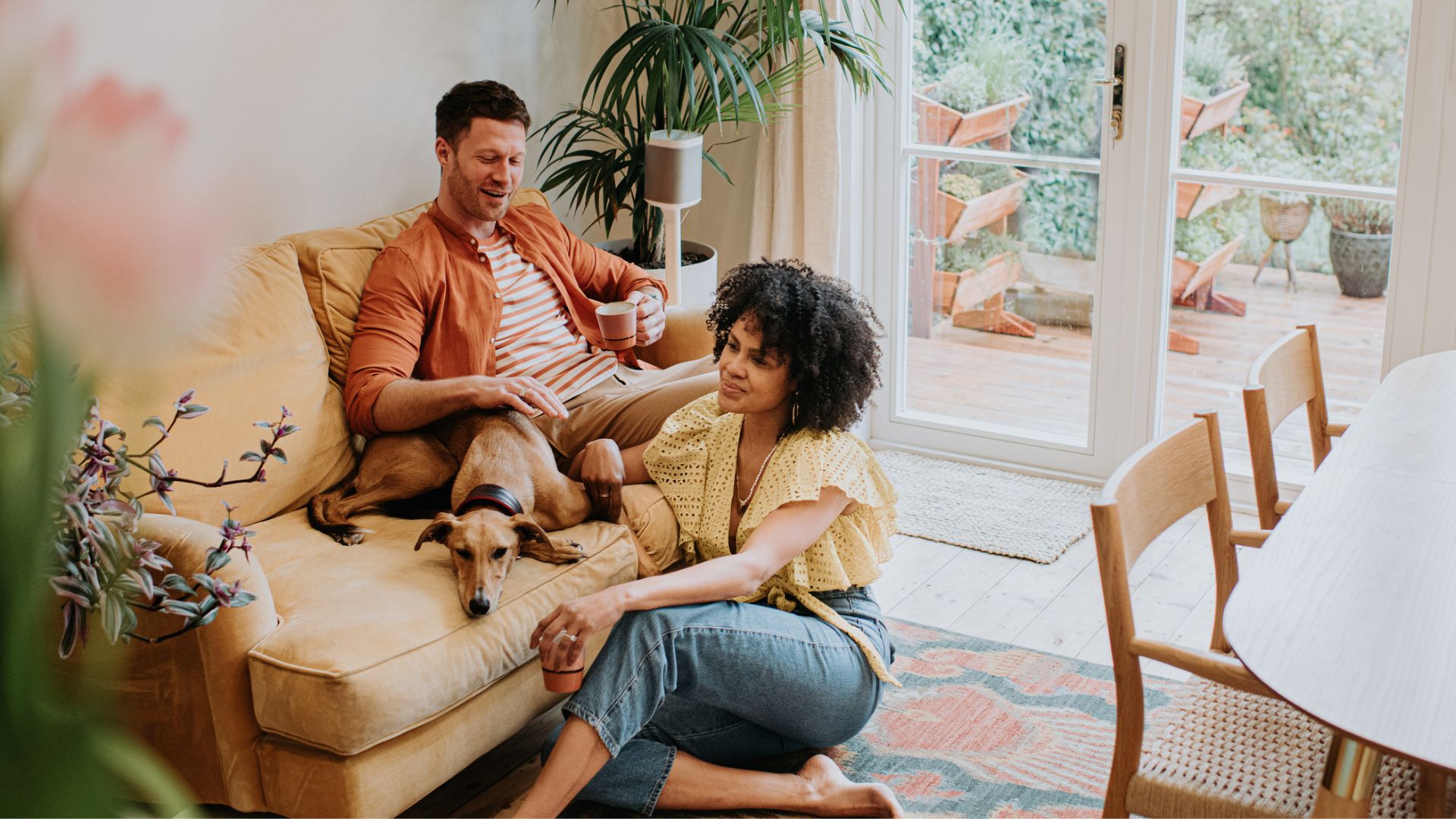The 13 red flags in a relationship you should never ignore
It can be hard to spot red flags in a relationship. Here, therapists reveal the top ones to look out for


Emily Smith
From telling white lies to monitoring your social media, red flags in a relationship are warning signs of unhealthy or toxic behavior.
Red flags may seem like something invented by social media, with red flag emojis popping up on Instagram and Twitter to signal problematic behavior - both serious and sarcastic - but they can be useful ways to determine whether or not a relationship is suited to you.
Some red flags in a relationship are minor while others can signal signs of a toxic relationship and the potential for much bigger issues down the line. Here, to explain what red flags are and the ones to really look out for when you're dating someone new, we've spoken to a trauma-informed positive psychologist.
What are red flags in a relationship?
Red flags are warning signs of a potentially unhealthy, abusive, manipulative, or generally toxic relationship. While anyone can display red flags in a relationship or see them in someone else, they're often spoken about in the context of romantic partnerships.
The experience of spotting a red flag in a partner may feel a little disconcerting and lead you to instinctively second-guess the other person. Whether it's because you feel they might be lying, are displaying a character trait you find offputting, or behaving in a way that makes you uncomfortable, it's important to pay attention to these moments. These are the flags waving at you.
Some people choose to acknowledge the red flag moment and end the partnership altogether or establish deal breakers in the relationship to prevent the red flag from becoming a bigger problem. However, red flags aren't always recognizable. "People can mask their true behavior, which can make them dangerous. Over a period of time, the warning alert of a red flag gets louder and louder, it just depends whether we can see or hear it," says Caroline Strawson, an ICF-accredited, trauma-informed therapist and coach.
The opposite of a red flag is a green flag which, as the name suggests, represents signs that a relationship is healthy. "They are behaviors that show the person is thoughtful, kind, caring, and open to communication even if you disagree with each other," says Strawson, who is also a divorce and breakup coach. "Signs of a healthy relationship often include how well you navigate disagreements, as this can show up many red flags."
Sign up for the woman&home newsletter
Sign up to our free daily email for the latest royal and entertainment news, interesting opinion, expert advice on styling and beauty trends, and no-nonsense guides to the health and wellness questions you want answered.

Common red flags in a relationship that you should never ignore
If you spot any of these red flags, they're definitely worth addressing. Alone, they're not signs your relationship is over, but if you're experiencing several of them or your partner doesn't acknowledge them when you bring them up, it might be time to rethink your relationship.
1. They don't listen to you when you're speaking
This one can be hard to spot but it's worth looking out for. "If you catch them frequently not listening to you when you're speaking and they pivot the conversation to make it about them, this is a red flag," says Strawson. "For example, you may start to share a story or an anecdote and they interrupt or immediately say how they've done the same thing but bigger, better, or more than you. "
If you're spending time with them and feel frequently unheard or dismissed, with their choice of conversation dominating your time together, it's time to have a conversation.
2. They call their exes "crazy"
The "crazy ex-girlfriend" narrative is one we've all heard before. Not every relationship your partner has been in before is likely to have ended well, but shifting the blame onto the other person's behavior and potentially their mental health is a big red flag.
"If your partner is saying all their past relationships have ended because of 'crazy' exes, look for the common denominator," suggests Strawson. "It's them."
3. They talk about big milestones early on
"If the person starts to talk about living together, getting married, living happily ever after, and generally moving too quickly, this is a huge red flag," Strawson says. Most people want to know that the person they're dating is invested in some kind of future, but this is too much - especially if it makes you uncomfortable or crosses a boundary you have set with them.
Sure, they may just be excited about said future and jumped the gun a bit. There's nothing wrong with having serious discussions about what you're both looking for in the long term. After all, it's the number one way to learn how to overcome relationship anxiety in the first place. But the suggestion that big moves like these happen in the next few weeks when you've just started dating is a step too far. "This is a huge red flag and it's a sign of a toxic relationship," Strawson says. "They want to hook you into something serious and are testing the waters to get your reaction."
Lyndsey Murray, AASECT certified sex therapist, agrees. "This isn't to say that feeling chemistry with someone early on is bad, but when someone already wants to start building a life with you before they even know your last name, it can come off as desperation or insecurity that could cause problems should you get into a relationship with them," she says.

4. They are pressuring you to have sex before you're ready
Consent is the foundation of any healthy, happy relationship, so if they make you question even for a second whether they value this, it's a red flag. This might be pressuring you to have sex or do sexual activities before you feel you're ready, but it also applies to other types of physical touching, like hugging, kissing, or touching your body in any way.
"They might use subtle language like 'it's because I like you so much' or ask 'don't you like me as much as I like you?'," warns Strawson, but this is indicative of much wider problematic behavior. When it comes to sex, she says, "They may think that if you're physical early enough, you'll be hooked into the relationship quicker."
5. You think they might be lying
Research from Maastricht University suggests that we all lie sometimes (about twice a day apparently), making it a fairly normal thing to do to some degree. Who hasn't told a white lie to avoid upsetting a friend or family member? However, catching your partner lying repeatedly is one of the biggest red flags in a relationship. How can you trust someone long-term if you never quite believe what they're saying?
If they're lying to potentially cover themselves, as they know they've crossed a boundary in the relationship, this is disrespectful to you. It's also very difficult to build trust in a relationship if you can't be sure what you're partner is saying is the truth.
6. Your partner wants access to your social media accounts
Social media provides people with access to the whole world at their fingertips. For those with jealous tendencies more severe than what's considered healthy or 'normal', a look at who their partner has been interacting with might be something they think they need.
This is one of the biggest red flags, says Strawson. "This is controlling behavior," she explains bluntly. "You should be able to have your own accounts and your own passwords. They may suggest it's about you and your behavior that's causing their jealousy, telling you you're acting suspiciously. But this is a sign of an abusive relationship, gaslighting, and coercive behavior."

7. Spending less time together
This may be a tough one to spot, depending on how much time you regularly spend with your partner and also how much time you physically can spend with them.
Kendra Capalbo, a licensed sex and couples therapist, uses the example of post-work downtime. A red flag here would be if your partner was "opting to watch TV or read before bed in different rooms rather than spending that time together."
It's the conscious decision to not spend that all-important free time you have with your partner that should send warning signs, she says.
8. Love bombing
This is a relatively new term but the toxic behavior it describes has been around for a long time. Love bombing is when a partner is overly enamored with you from the very beginning of your relationship. This can manifest in a number of seemingly admirable ways. They might want to spend an overwhelming amount of time with you, they may buy you lots of expensive gifts, or even confess their love for you really early on in your relationship.
It's such a cause for concern that the Crown Prosecution Service in the UK recently put the term under its guidance around coercive control and gaslighting behavior as a sign of abuse, warning that it's a tactic used to interrupt or negate abusive behavior in a relationship.
9. Extreme codependency
It’s great to have someone you can rely on and want to spend time with. However, as with most behaviors there needs to be a balance. Murray, at Relationship Matters Therapy, explains that the extreme end of codependency is a big red flag.
"They rely on you to a degree where it feels uncomfortable, an example would be: If you make plans with friends and you then have to hear how devastating that is for them, how sad that makes them, how you aren't there for them, etc. This can be a sign that someone has codependent traits," she says.
It’s also important to recognize when codependent behavior is due to a distrust in your relationship or perhaps an insecurity in that individual's life. If it's the latter, then perhaps an understanding conversation can be had to explore why your partner is feeling this way.
10. Bringing in un-resolved trust issues to a new relationship
If you begin to notice your partner having trust issues, that you understand to be leftover from a previous partnership, this is a red flag. It's one of the most common out there and one you should really look out for.
She says, “Partners may have issues with trust and make you feel that you have to prove you are trustworthy when you have done nothing to break their trust.” You cannot be treated differently or trusted less because of the actions of someone else and your partner should not bring unresolved trust issues into your relationship.
11. Unable to manage conflict without escalation
Capalbo, who is also the founder of Esclusiva Couples Retreats, argues that this is one of the most common red flags she sees in her clients' relationships: the inability to stop a small argument from becoming a bigger one.
This is also linked to the issue of miscommunication and being unable to talk through your problems without anger. If you find yourself unable to talk to your partner, it may be time to approach this issue more seriously and have a controlled conversation with them. If you feel like this is not an option due to your communication issues then a mediator or licensed therapist may be able to help.

12. Receiving unsolicited nudes
Sending and receiving nude pictures can be one of the ways to spice up your relationship - but, obviously, only if it's consensual. We hear about unsolicited nude pictures in relation to strangers on the internet but it can also be a problem in new relationships. Michelle Elman, author and life coach, partnered with the dating site Plenty of Fish to tackle this specific problem. According to research by the company, which features in the Desirable Dating Guide, 40% of participants had been sent these sorts of pictures before.
"Perhaps technological advancements have contributed to the frequency of this red flag, but these behaviors do also exist in society," she says. If your partner isn't asking for consent before sending you a sexy picture and it's making you uncomfortable, it's best to communicate this and really solidify your sexual boundaries.
13. They're critical of the things you enjoy
Surely your partner shouldn't be criticizing your personality if they want to date you? It may be more rare in comparison to the other red flags in a relationship on this list, it happens more than you might think. As an example, within the same research conducted by PoF, Elman found that one in 10 singles experience their social media habits being criticized. The behavior can also show itself through the guise of subtle mocking or them invalidating the things you love.
Elman says, "I tell people it’s always important to listen to your gut instinct. If someone is criticizing you early on, know your self-worth and end the conversation right there. Remember, people earn the right to get to know you."
Why red flags are important to look out for
Red flags are important to look out for because they can tell you a lot about how the relationship might develop, whether it's a new situation or you're getting back with an ex. "They can be indicative of unhealthy and manipulative behavior," says Strawson.
The development of red flags into wider relationship issues is something the therapist has seen personally in her practice. "With all the women I work with, there are always red flags there, they just didn't acknowledge them. Red flags aren't always recognizable, sometimes they can even look like those the person is just keen on you, but this can turn dark and abusive quickly."
While there's no way to really predict if a red flag is just a personality clash or something more serious, Strawson suggests listening to your gut is the best way forward. If something feels wrong, it probably is, she says. "There is a lot of information that passes from the gut to the brain and vice versa but often we don't listen. Start to connect with a sensation in your body if one comes about and get curious about it. This is your internal warning system going off."
Red flags v yellow flags: what's the difference?
Red flags are immediate warning signals of a potential issue in a relationship, whereas yellow flags are a little less serious and can be avoided. Therapist Lyndsey Murray describes them as "something to be aware of that with the proper conflict management and self-awareness, could turn around and help the relationship flourish." In both cases though, it's important to recognize the flags early and actively work through them as soon as possible.
To explain the difference, Murray draws on the following example: "If your partner gets upset that you've made plans without then with your own group of friends, but not to a degree where you feel unsafe, you can approach them [for a conversation about it] and see if they're open to the discussion. There can be a lot to uncover for you both."
That information, she says, can then be used to evaluate if you are compatible to continue the relationship or not. If your partner is unwilling to discuss these issues, then perhaps what once was a yellow flag of individual insecurity is now a red flag of miscommunication issues.
If you’re seeing yellow flags pop up early in your relationship it may be enough for you to re-consider committing. Elman’s advice is clear: “If a number of yellow flags aren’t sitting well with you and are making you feel uncomfortable, it’s important you tune in to your own feelings and act accordingly.”
She says, “Singles should feel empowered to never accept less than they deserve, and regardless of whether it’s a yellow or a red flag. If someone is behaving undesirably towards you, you are the one that gets to choose whether to invest more time and energy or simply end the conversation and move on to the next."
What to do when you see red flags in your relationships
- Establish boundaries: Really think about what you need from your relationship, says Murray. "Identifying what your boundaries are will help you determine what steps to take if you see red flags." This will also help further down the line if you need to learn how to be happy in a relationship.
- Address the issue straight away: When you start to see red flags in the relationship, it is important to address them right away by talking to your partner about your concerns," says Capalbo. The longer you leave the issues unresolved and unaddressed then the worse it can become.
- Trust your gut: Elman stresses the importance of this universally-powerful tool. "If we have a gut feeling, if we feel uncomfortable, or if we are repeatedly being exposed to behaviors that we deem unacceptable, it’s probably time to have a conversation about it. And if speaking your mind, being honest and open isn’t well received, then it’s probably best to walk away altogether," she says.
- Self-reflect: Capalbo suggests taking a moment to self-reflect before having a conversation with your partner about their behavior. She suggests: "Include your own self-reflection on the areas of the relationship where you feel like you could be showing up more. Speak to the fact you recognize you both have areas where you could make improvements. Asking your partner what they wish you were doing differently to help connect is one way to do this."
- Assess how safe you feel: If your partner is acting dangerously, you are feeling severely uncomfortable or your wellbeing is being threatened then Murray says the best thing to do is to reach out to a professional. In an emergency, always dial 911 in the US or 999 in the UK.
- Accept that you cannot control your partner: Murry says, “All you can do is decide what you need in order to make a decision about being in this relationship or not.”

Grace Walsh is woman&home's Health Channel Editor, working across the areas of fitness, nutrition, sleep, mental health, relationships, and sex. She is also a qualified fitness instructor. In 2025, she will be taking on her third marathon in Brighton, completing her first ultra marathon, and qualifying as a certified personal trainer and nutrition coach.
A digital journalist with over seven years experience as a writer and editor for UK publications, Grace has covered (almost) everything in the world of health and wellbeing with bylines in Cosmopolitan, Red, The i Paper, GoodtoKnow, and more.
- Emily SmithDigital lifestyle writer
-
 All the lessons we've learned from Professor Tim Spector on optimising your health and wellbeing
All the lessons we've learned from Professor Tim Spector on optimising your health and wellbeingIf anyone's qualified to give us lessons on how to eat better, it's Professor Tim Spector - and these are his best lessons
By Grace Walsh Published
-
 How to charm your in-laws: the ultimate guide to keeping the peace
How to charm your in-laws: the ultimate guide to keeping the peaceDiscover how to strengthen your in-law relationships, one thoughtful gesture at a time
By Natalie Denton Published